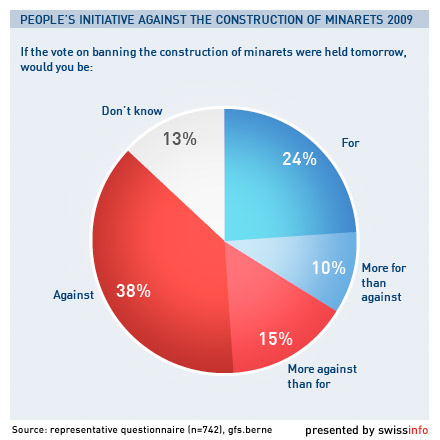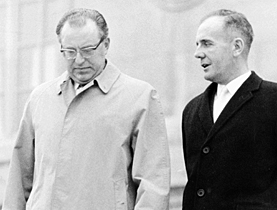Poll shows majority against banning minarets

Will Swiss voters ban the construction of minarets in Switzerland on November 29? Not according to an opinion poll published on Friday.
The survey, commissioned by the Swiss Broadcasting Corporation, swissinfo.ch’s parent company, says the initiative’s rightwing supporters are set for disappointment – along with leftwing voters who want to ban the export of war materiel – but it’s going to be close.
The first poll on the issue by the leading gfs.berne polling and research institute says 53 per cent of Swiss currently reject the anti-minaret initiative.
Unsurprisingly, most support comes from voters sympathetic to the rightwing Swiss People’s Party, which proposed the initiative along with a small ultra-conservative Christian party to counter what they describe as a “creeping Islamicisation”.
Two-thirds thought four minarets in Switzerland was enough, along with 37 per cent of voters who traditionally support the centre-right Christian Democratic Party.
Voters on the left of the political spectrum rejected the initiative, with 73 per cent of Green Party voters saying no.
Both German- and French-speaking Switzerland rejected the proposal, by 54 and 52 per cent respectively, but voters in Italian-speaking Switzerland bucked the trend, with 53 per cent of voters backing it.
Clear message?
From a sociological point of view, non-believers and people with a monthly income above SFr11,000 ($10,900) were most likely to reject the initiative.
As for which arguments resonated most with the public, 53 per cent of yes voters justified their decision by wanting to send a clear message against sharia law, while 51 per cent didn’t want minarets but had no problems with mosques. Forty-four per cent considered minarets a symbol of power and domination.
On the no side, 52 per cent agreed with the government’s stance that acceptance of the initiative would damage Switzerland’s economic and political relations with Muslim countries, and 46 per cent thought it would undermine already fragile relations between faiths.
The pollsters believe the yes votes could gain ground in the coming weeks, but not enough to affect the outcome.
“People who say they have no political affiliation or who tend towards the People’s Party are a potential target for the yes campaigners – their arguments against sharia or that minarets are a symbol of domination are capable of winning over those voters,” they said.
Arms exports
Also on November 29 the electorate will have its say – for the third time since 1972 – on an initiative calling for a ban on the export of war materiel, with the exception of demining systems and those for civil protection.
Economics Minister Doris Leuthard has warned against acceptance of the initiative, arguing that Swiss technical innovation was at stake in addition to the industry’s 5,100 jobs. She also said arms exports to countries involved in Iraq and Afghanistan were allowed because the United Nations supported participation in those conflicts.
That 41 per cent of respondents say they are in favour of a ban comes as something of a surprise – in the previous vote on the issue, 12 years ago, the Swiss refused to ban the export of arms by 77.5 per cent.
In fact only 44 per cent said they would reject the initiative, which was launched by the pacifist Group for a Switzerland without an Army.
Fifteen per cent were undecided. The survey’s authors said this issue had been eclipsed by the minarets and people were still forming their opinion.
Neutrality
Similarly to that of minarets, the issue of arms exports was also split along party lines, with People’s Party, Radical and Christian Democrat voters rejecting it by 63, 58 and 55 per cent respectively.
On the other side of the political spectrum, 63 per cent of Green and 56 per cent of Social Democrat voters wanted to see the end of arms exports.
For them, the strongest argument, backed by 64 per cent of respondents, was that Switzerland should not make a profit from selling weapons. Fifty-five per cent also believed this broke Swiss neutrality – however the same proportion feared the economic consequences of a ban.
Fifty-seven per cent of Swiss thought the current law on arms exports was adequate and 52 per cent believed Switzerland should remain independent when it came to armament.
The gfs researchers said the pacifists were likely to lose on November 29 “because people who traditionally gravitate towards the centre will agree with the arguments against the initiative”.
As for voter turnout, the survey’s authors indicate that 44 per cent of Swiss intended to vote – nothing special, despite the emotional nature of the minaret vote. The average turnout in recent decades has been just over 40 per cent.
Carole Wälti, swissinfo.ch (Adapted from French by Thomas Stephens)
A minaret initiative was handed in to the government in July 2008 after more than the required 100,000 signatures were collected. The text is only one sentence long: “The building of minarets is forbidden.”
The government’s response, calling on the electorate to reject it, was much longer, running to 50 pages. In essence, the cabinet argues that the prohibition of the spires, usually found outside mosques, would violate international human rights norms. It also said that a ban would hinder integration and would be ineffective in the fight against extremism.
The Swiss population will vote on the issue on November 29.
The country’s Muslim community says it is stunned by what it sees as an “Islamophobic” move, which it warns will undermine already fragile relations.
Both the Protestant and Catholic churches have rallied to their defence, along with most political parties, human rights experts and a number of cabinet ministers.
In Switzerland, only the mosques in Geneva, Zurich and Wangen near Olten have a minaret, Winterthur’s mosque only has a small one. But the call to prayer is not made from these minarets.
Building applications for minarets in at least two other towns, Langenthal and Wil, led to heated debates at the local level.


In compliance with the JTI standards
More: SWI swissinfo.ch certified by the Journalism Trust Initiative













You can find an overview of ongoing debates with our journalists here . Please join us!
If you want to start a conversation about a topic raised in this article or want to report factual errors, email us at english@swissinfo.ch.